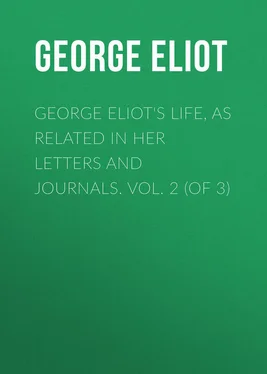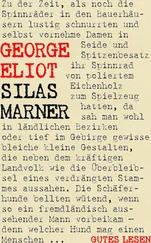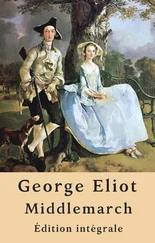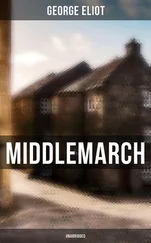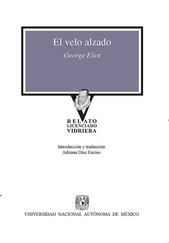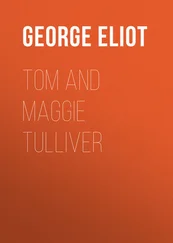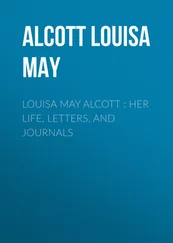George Eliot - George Eliot's Life, as Related in Her Letters and Journals. Vol. 2 (of 3)
Здесь есть возможность читать онлайн «George Eliot - George Eliot's Life, as Related in Her Letters and Journals. Vol. 2 (of 3)» — ознакомительный отрывок электронной книги совершенно бесплатно, а после прочтения отрывка купить полную версию. В некоторых случаях можно слушать аудио, скачать через торрент в формате fb2 и присутствует краткое содержание. Издательство: Иностранный паблик, Жанр: literature_19, foreign_antique, foreign_prose, на английском языке. Описание произведения, (предисловие) а так же отзывы посетителей доступны на портале библиотеки ЛибКат.
- Название:George Eliot's Life, as Related in Her Letters and Journals. Vol. 2 (of 3)
- Автор:
- Издательство:Иностранный паблик
- Жанр:
- Год:неизвестен
- ISBN:нет данных
- Рейтинг книги:3 / 5. Голосов: 1
-
Избранное:Добавить в избранное
- Отзывы:
-
Ваша оценка:
- 60
- 1
- 2
- 3
- 4
- 5
George Eliot's Life, as Related in Her Letters and Journals. Vol. 2 (of 3): краткое содержание, описание и аннотация
Предлагаем к чтению аннотацию, описание, краткое содержание или предисловие (зависит от того, что написал сам автор книги «George Eliot's Life, as Related in Her Letters and Journals. Vol. 2 (of 3)»). Если вы не нашли необходимую информацию о книге — напишите в комментариях, мы постараемся отыскать её.
George Eliot's Life, as Related in Her Letters and Journals. Vol. 2 (of 3) — читать онлайн ознакомительный отрывок
Ниже представлен текст книги, разбитый по страницам. Система сохранения места последней прочитанной страницы, позволяет с удобством читать онлайн бесплатно книгу «George Eliot's Life, as Related in Her Letters and Journals. Vol. 2 (of 3)», без необходимости каждый раз заново искать на чём Вы остановились. Поставьте закладку, и сможете в любой момент перейти на страницу, на которой закончили чтение.
Интервал:
Закладка:
Letter to Miss Sara Hennell, 15th April, 1859.
Mr. Lewes is "making himself into four" in writing answers to advertisements and other exertions which he generously takes on himself to save me. A model husband!
We both like your literal title, "Thoughts in Aid of Faith," very much, and hope to see a little book under that title before the year is out – a book as thorough and effective in its way as "Christianity and Infidelity."
Re writing is an excellent process, frequently both for the book and its author; and to prevent you from grudging the toil, I will tell you that so old a writer as Mr. Lewes now re writes everything of importance , though in all the earlier years of his authorship he would never take that trouble.
We are so happy in the neighborhood of Mr. and Mrs. Richard Congreve. She is a sweet, intelligent, gentle woman. I already love her: and his fine, beaming face does me good, like a glimpse of an Olympian.
Journal, 1859.
April 17. – I have left off recording the history of "Adam Bede" and the pleasant letters and words that came to me – the success has been so triumphantly beyond anything I had dreamed of that it would be tiresome to put down particulars. Four hundred of the second edition (of 750) sold in the first week, and twenty besides ordered when there was not a copy left in the London house. This morning Hachette has sent to ask my terms for the liberty of translation into French. There was a review in the Times last week, which will naturally give a new stimulus to the sale; and yesterday I sent a letter to the Times denying that Mr. Liggins is the author, as the world and Mr. Anders had settled it. But I must trust to the letters I have received and preserved for giving me the history of the book if I should live long enough to forget details.
Shall I ever write another book as true as "Adam Bede?" The weight of the future presses on me, and makes itself felt even more than the deep satisfaction of the past and present.
Letter to John Blackwood, 20th April, 1859.
This myth about Liggins is getting serious, and must be put a stop to. We are bound not to allow sums of money to be raised on a false supposition of this kind. Don't you think it would be well for you to write a letter to the Times , to the effect that, as you find in some stupid quarters my letter has not been received as a bonâ-fide denial, you declare Mr. Liggins not to be the author of "Clerical Scenes" and "Adam Bede;" further, that any future applications to you concerning George Eliot will not be answered, since that writer is not in need of public benevolence. Such a letter might save us from future annoyance and trouble, for I am rather doubtful about Mr. Liggins's character. The last report I heard of him was that he spent his time in smoking and drinking. I don't know whether that is one of the data for the Warwickshire logicians who have decided him to be the author of my books.
Journal, 1859.
April 29. – To-day Blackwood sent me a letter from Bulwer, which I copy because I have to send back the original, and I like to keep in mind the generous praise of one author for another.
Letter from E. B. Lytton to John Blackwood.
"My dear Sir, – I ought long since to have thanked you for 'Adam Bede.' But I never had a moment to look at it till arriving here, and ordered by the doctors to abstain from all 'work.'
"I owe the author much gratitude for some very pleasing hours. The book indeed is worthy of great admiration. There are touches of beauty in the conception of human character that are exquisite, and much wit and much poetry embedded in the 'dialect,' which nevertheless the author over-uses.
"The style is remarkably good whenever it is English and not provincial – racy, original, and nervous.
"I congratulate you on having found an author of such promise, and published one of the very ablest works of fiction I have read for years. —
Yours truly,
E. B. L."I am better than I was, but thoroughly done up."
Journal, 1859.
April 29. – Finished a story – "The Lifted Veil" – which I began one morning at Richmond as a resource when my head was too stupid for more important work.
Resumed my new novel, of which I am going to rewrite the two first chapters. I shall call it provisionally "The Tullivers," for the sake of a title quelconque , or perhaps "St. Ogg's on the Floss."
Letter to John Blackwood, 29th April, 1859.
Thank you for sending me Sir Edward Lytton's letter, which has given me real pleasure. The praise is doubly valuable to me for the sake of the generous feeling that prompted it. I think you judged rightly about writing to the Times . I would abstain from the remotest appearance of a "dodge." I am anxious to know of any positive rumors that may get abroad; for while I would willingly, if it were possible – which it clearly is not – retain my incognito as long as I live, I can suffer no one to bear my arms on his shield.
There is one alteration, or rather an addition – merely of a sentence – that I wish to make in the 12 s. edition of "Adam Bede." It is a sentence in the chapter where Adam is making the coffin at night, and hears the willow wand. Some readers seem not to have understood what I meant – namely, that it was in Adam's peasant blood and nurture to believe in this, and that he narrated it with awed belief to his dying day. That is not a fancy of my own brain, but a matter of observation, and is, in my mind, an important feature in Adam's character. There is nothing else I wish to touch. I will send you the sentence some day soon, with the page where it is to be inserted.
Journal, 1859.
May 3. – I had a letter from Mrs. Richard Congreve, telling me of her safe arrival, with her husband and sister, 7 7 Miss Emily Bury, now Mrs. Geddes.
at Dieppe. This new friend, whom I have gained by coming to Wandsworth, is the chief charm of the place to me. Her friendship has the same date as the success of "Adam Bede" – two good things in my lot that ought to have made me less sad than I have been in this house.
Letter to Mrs. Congreve, 4th May, 1859.
Your letter came yesterday at tea-time, and made the evening happier than usual. We had thought of you not a little as we listened to the howling winds, especially as the terrible wrecks off the Irish coast had filled our imaginations disagreeably. Now I can make a charming picture of you all on the beach, except that I am obliged to fancy your face looking still too languid after all your exertion and sleeplessness. I remember the said face with peculiar vividness, which is very pleasant to me. "Rough" has been the daily companion of our walks, and wins on our affections, as other fellow mortals do, by a mixture of weaknesses and virtues – the weaknesses consisting chiefly in a tendency to become invisible every ten minutes, and in a forgetfulness of reproof, which, I fear, is the usual accompaniment of meekness under it. All this is good discipline for us selfish solitaries, who have been used to stroll along, thinking of nothing but ourselves.
We walked through your garden to-day, and I gathered a bit of your sweetbrier, of which I am at this moment enjoying the scent as it stands on my desk. I am enjoying, too, another sort of sweetness, which I also owe to you – of that subtle, haunting kind which is most like the scent of my favorite plants – the belief that you do really care for me across the seas there, and will associate me continually with your home. Faith is not easy to me, nevertheless I believe everything you say and write.
Write to me as often as you can – that is, as often as you feel any prompting to do so. You were a dear presence to me, and will be a precious thought to me all through your absence.
Читать дальшеИнтервал:
Закладка:
Похожие книги на «George Eliot's Life, as Related in Her Letters and Journals. Vol. 2 (of 3)»
Представляем Вашему вниманию похожие книги на «George Eliot's Life, as Related in Her Letters and Journals. Vol. 2 (of 3)» списком для выбора. Мы отобрали схожую по названию и смыслу литературу в надежде предоставить читателям больше вариантов отыскать новые, интересные, ещё непрочитанные произведения.
Обсуждение, отзывы о книге «George Eliot's Life, as Related in Her Letters and Journals. Vol. 2 (of 3)» и просто собственные мнения читателей. Оставьте ваши комментарии, напишите, что Вы думаете о произведении, его смысле или главных героях. Укажите что конкретно понравилось, а что нет, и почему Вы так считаете.
